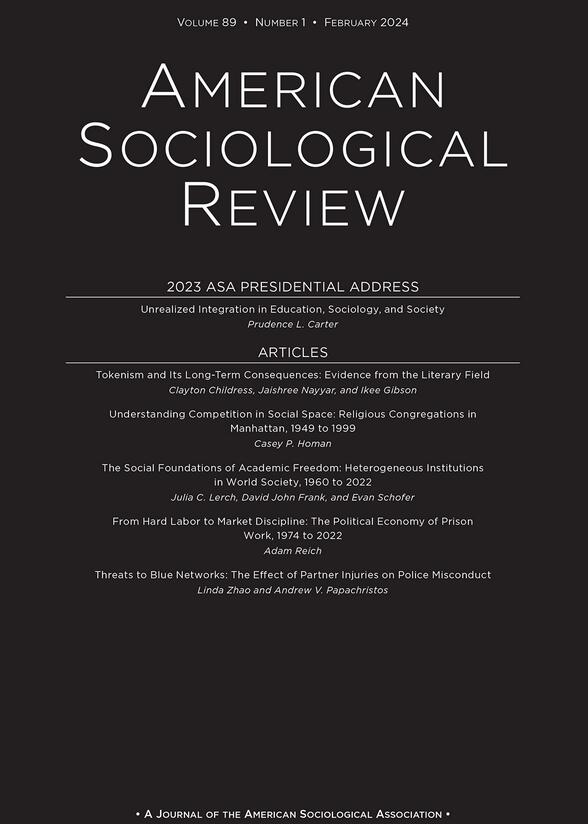双重危险:教师偏见,种族化组织,以及学校纪律中种族/民族差异的产生
IF 6.2
1区 社会学
Q1 SOCIOLOGY
引用次数: 18
摘要
这篇文章将社会心理学研究与种族化组织的学术研究相结合,展示了个人偏见和组织人口构成如何共同作用,以塑造学校歧视的程度。为了理解黑人和拉丁裔男孩在行为差异中持续存在的较高纪律率,我将一个涉及295所美国学校的1339名教师的原始视频实验与学校种族/民族和社会经济构成的组织数据结合起来。在实验中,老师们观看并回应随机分配的一段视频,视频中一个白人、黑人或拉丁裔男孩犯了同样的、常规的课堂不当行为。我发现,与白人男孩相比,黑人和拉丁裔男孩面临双重危险。他们经历了(1)个人层面的教师偏见,他们被认为更“应该受到指责”,更容易因同样的不当行为而被提及;(2)种族化的组织氛围,指责加剧,在少数民族人口较多的学校,所有种族/民族的学生都被认为更“应该受到指责”,而在以白人为主的学校里,这些学生同样的不当行为。本研究对学校纪律中种族/民族不平等的产生有了更全面的理解,通过经验确定了一个双重过程,包括教师个人偏见和与少数民族组织构成有关的高度指责。本文章由计算机程序翻译,如有差异,请以英文原文为准。
Double Jeopardy: Teacher Biases, Racialized Organizations, and the Production of Racial/Ethnic Disparities in School Discipline
Bridging research in social psychology with scholarship on racialized organizations, this article shows how individual bias and organizational demographic composition can operate together to shape the degree of discrimination in schools. To understand Black and Latino boys’ higher rates of discipline that persist net of differences in behavior, I combine an original video experiment involving 1,339 teachers in 295 U.S. schools with organizational data on school racial/ethnic and socioeconomic composition. In the experiment, teachers view and respond to a randomly assigned video of a White, Black, or Latino boy committing identical, routine classroom misbehavior. I find that, compared to White boys, Black and Latino boys face a double jeopardy. They experience both (1) individual-level teacher bias, where they are perceived as being more “blameworthy” and referred more readily for identical misbehavior, and (2) racialized organizational climates of heightened blaming, where students of all races/ethnicities are perceived as being more “blameworthy” for identical misbehavior in schools with large minority populations versus in predominantly White schools. This study develops a more comprehensive understanding of the production of racial/ethnic inequality in school discipline by empirically identifying a dual process that involves both individual teacher bias and heightened blaming that is related to minority organizational composition.
求助全文
通过发布文献求助,成功后即可免费获取论文全文。
去求助
来源期刊

American Sociological Review
SOCIOLOGY-
CiteScore
13.30
自引率
3.30%
发文量
35
期刊介绍:
The American Sociological Association (ASA) is a non-profit membership association established in 1905. Its mission is to advance sociology as a scientific discipline and profession that serves the public good. ASA is comprised of approximately 12,000 members including faculty members, researchers, practitioners, and students in the field of sociology. Roughly 20% of the members work in government, business, or non-profit organizations.
One of ASA's primary endeavors is the publication and dissemination of important sociological research. To this end, they founded the American Sociological Review (ASR) in 1936. ASR is the flagship journal of the association and publishes original works that are of general interest and contribute to the advancement of sociology. The journal seeks to publish new theoretical developments, research results that enhance our understanding of fundamental social processes, and significant methodological innovations. ASR welcomes submissions from all areas of sociology, placing an emphasis on exceptional quality.
Aside from ASR, ASA also publishes 14 professional journals and magazines. Additionally, they organize an annual meeting that attracts over 6,000 participants. ASA's membership consists of scholars, professionals, and students dedicated to the study and application of sociology in various domains of society.
 求助内容:
求助内容: 应助结果提醒方式:
应助结果提醒方式:


